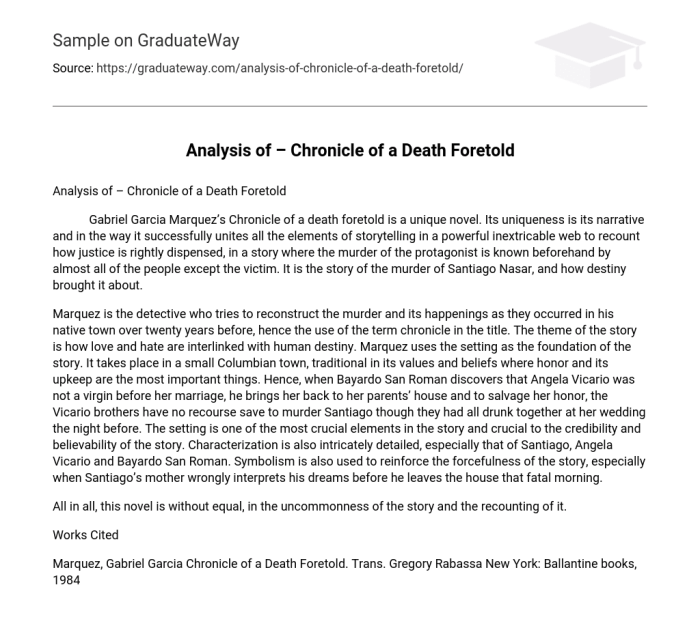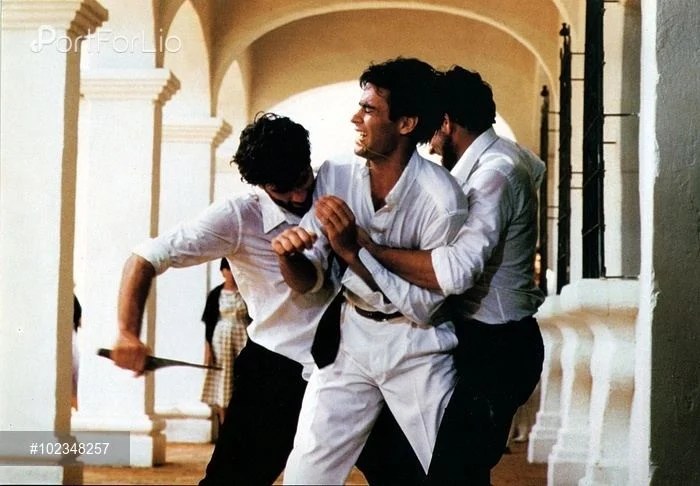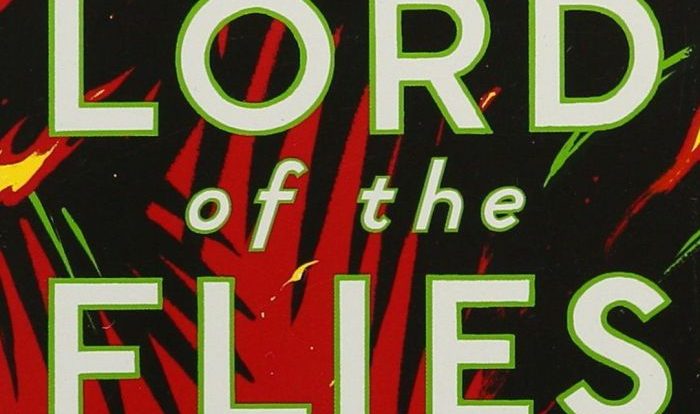Irony in Chronicle of a Death Foretold, a masterpiece by Gabriel García Márquez, serves as a poignant literary device that enhances the narrative, shapes characterization, and explores profound themes. Through verbal, situational, and dramatic irony, Márquez masterfully unravels the tragic fate of Santiago Nasar, illuminating the futility of human actions and the inevitability of destiny.
This literary analysis delves into the multifaceted role of irony in the novel, examining its impact on character perceptions, the narrative structure, and the novel’s cultural and historical context. By dissecting the intricate interplay of irony and its literary elements, we gain a deeper understanding of the novel’s themes and the human condition it portrays.
Irony in Chronicle of a Death Foretold
Gabriel García Márquez’s Chronicle of a Death Foretold is a masterpiece of irony, employing various types of irony to enhance the narrative, shape characters, explore themes, and provide insights into the cultural context.
Literary Devices
Verbal Irony
Verbal irony occurs when a character says one thing but means another. For instance, when Santiago Nasar tells his friend Cristo Bedoya, “I’m not going to let them kill me like a pig,” he is being ironic because he knows that he is about to be murdered.
Situational Irony
Situational irony occurs when a situation turns out differently from what is expected. For example, the fact that Santiago Nasar is killed in the doorway of his own house, a place where he should be safe, is a cruel twist of irony.
Dramatic Irony
Dramatic irony occurs when the audience knows something that the characters do not. Throughout the novel, the reader is aware of Santiago Nasar’s impending death, which creates a sense of suspense and makes the characters’ actions seem futile.
Character Analysis

Santiago Nasar
Irony plays a significant role in shaping Santiago Nasar’s character. His arrogance and self-confidence are ironic in light of his tragic fate. The fact that he is killed by the Vicario brothers, whom he has wronged, is also ironic.
Other Characters
Irony also affects the perceptions of other characters towards Santiago. For instance, the narrator suggests that Angela Vicario’s initial attraction to Santiago is ironic because she does not know that he has already slept with her sister.
Thematic Exploration

Fate and Destiny
Irony highlights the themes of fate and destiny in the novel. The fact that Santiago Nasar’s death is foretold suggests that his fate is predetermined. However, the characters’ actions also contribute to his death, which raises questions about the role of free will.
Futility of Human Actions
Irony underscores the futility of human actions. The characters’ attempts to prevent Santiago Nasar’s death are ultimately unsuccessful, which suggests that human beings have limited control over their own destiny.
Narrative Structure
Foreshadowing and Flashbacks
Márquez uses foreshadowing and flashbacks to create irony. The narrator repeatedly hints at Santiago Nasar’s impending death, which creates a sense of foreboding. The use of flashbacks also allows the reader to see the events leading up to Santiago’s death from different perspectives, which deepens the ironic effect.
Non-Linear Narrative
The novel’s non-linear narrative structure also contributes to the ironic effect. The reader learns about Santiago Nasar’s death at the beginning of the novel, but the details of his murder are revealed gradually through flashbacks. This structure allows Márquez to build suspense and create a sense of inevitability.
Shifting Perspectives
The novel’s shifting perspectives enhance the reader’s understanding of irony. The narrator presents the events from different characters’ perspectives, which allows the reader to see how each character perceives Santiago Nasar’s death. This shifting perspective deepens the ironic effect by showing how different characters have different interpretations of the same events.
Symbolism and Motifs

Symbolism
Irony is conveyed through various symbols in the novel. For instance, the color white, which is often associated with purity and innocence, is used ironically to describe Santiago Nasar’s blood-stained shirt after his death.
Motifs, Irony in chronicle of a death foretold
The novel also uses motifs to convey irony. The motif of honor, for example, is used ironically to show how the Vicario brothers’ desire to restore their family’s honor leads to Santiago Nasar’s death.
Cultural and Historical Context

Social and Political Realities
Irony reflects the social and political realities of the time. The novel is set in a patriarchal society where women are expected to be subservient to men. The fact that Santiago Nasar is killed by the Vicario brothers for allegedly defiling Angela Vicario is ironic because it shows how women are often blamed for the actions of men.
Historical Setting
The novel’s historical setting also influences the use of irony. The novel is set during the time of the Colombian Civil War, a period of great violence and political instability. The fact that Santiago Nasar’s death is overshadowed by the larger political conflict is ironic because it shows how individual lives can be lost in the midst of larger historical events.
Q&A
What is the significance of verbal irony in the novel?
Verbal irony in Chronicle of a Death Foretold often manifests in the characters’ conversations, highlighting the gap between what is said and what is meant. This irony underscores the characters’ complex emotions and the underlying tensions within the community.
How does dramatic irony contribute to the novel’s tragic impact?
Dramatic irony in the novel creates a sense of suspense and inevitability. The reader’s knowledge of the impending tragedy juxtaposed with the characters’ unawareness heightens the emotional impact and emphasizes the futility of their actions.

